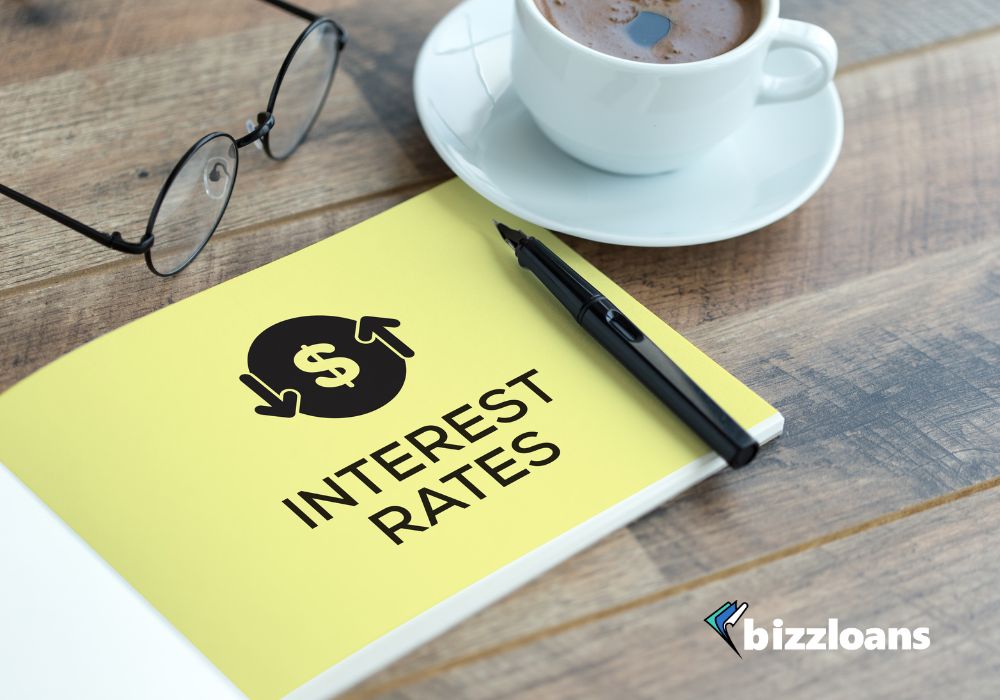Understanding the Average Interest Rates for Business Loans is crucial for entrepreneurs and business owners looking to secure financing for their ventures. By grasping the concept of business loan interest rates, individuals can make informed decisions and find the most suitable options for their financial needs.
Business loan interest rates refer to the percentage charged by lenders for borrowing funds. The interest rate ultimately determines the cost of the loan, along with other associated fees. Knowledge of average interest rates plays a pivotal role in assessing the affordability and feasibility of different loan options, enabling borrowers to make informed decisions.
Knowing average interest rates helps entrepreneurs evaluate the competitiveness of loan offers and identify the most favorable terms. It provides a benchmark for comparison, allowing borrowers to assess whether a particular interest rate aligns with market trends and industry standards.

Several factors influence business loan interest rates. The borrower’s credit score and business history hold significant weight as they reflect the creditworthiness and repayment capability of the borrower. Loan amount and term also impact interest rates, with larger loans and longer terms often resulting in higher rates. economic factors and market trends influence interest rates, such as inflation rates, monetary policies, and global economic conditions.
To understand average interest rates for different types of business loans, it is beneficial to delve into specific loan options. Small Business Administration (SBA) loans, bank loans, and online lenders each have their average interest rates, depending on their risk assessment models, repayment terms, and target borrowers.
Determining average interest rates can be accomplished through various tools and resources. Researching online platforms provides access to industry reports, lender websites, and financial market data. Consulting with financial institutions, such as banks or credit unions, grants borrowers insights into current interest rate offerings and the specific criteria they consider when assessing loan applications.
Lastly, securing the best interest rate on a business loan requires proactive measures. Borrowers can improve their credit scores and enhance their business financials to increase their creditworthiness in the eyes of lenders. Comparison shopping and negotiating with multiple lenders allow borrowers to leverage competitive offers. utilizing collateral or personal guarantees provides lenders with reassurance and may result in more favorable interest rate terms.
By understanding the average interest rates for business loans and employing strategic approaches, entrepreneurs can make well-informed decisions and secure financing options that align with their financial goals and capabilities.
Key takeaway:
- Understanding average interest rates for business loans is crucial: It helps entrepreneurs make informed decisions about borrowing and managing finances effectively.
- Factors affecting interest rates include credit score, loan amount, and economic factors: These variables influence the rates offered by lenders, making it important to assess them when considering loan options.
- Researching and consulting with financial institutions are valuable resources: Online research and discussions with banks and lenders can provide insights into average interest rates, aiding borrowers in making better decisions.
What Are Business Loan Interest Rates?
Business loan interest rates, also known as the cost borrowers must pay lenders for borrowing money for their businesses, are determined by several factors. These factors include the borrower’s creditworthiness, the duration of the loan, and the current market conditions. Lenders typically charge higher rates for riskier loans and lower rates for less risky loans. Hence, it is vital for business owners to conduct thorough research and compare rates offered by various lenders to find the most competitive options that suit their financial requirements.
To illustrate the significance of interest rates, consider John’s true story. As a small business owner looking to expand his bakery, John approached multiple banks for funding and received different interest rate proposals. After careful consideration, he opted for a lender who provided a reasonable fixed interest rate of 6% for a five-year loan term. This allowed John to accurately calculate his monthly loan payments and effectively plan his budget. With the loan, John successfully expanded his bakery, boosted his revenue, and fully repaid the loan within the agreed-upon timeframe. The competitive interest rate played a critical role in enabling John to grow his business and meet his financial objectives.
Importance of Understanding Average Interest Rates for Business Loans
Understanding the importance of average interest rates for business loans is crucial for any business owner. By having a comprehensive understanding of these rates, you are able to make informed decisions about borrowing money and effectively manage your finances. This knowledge allows you to accurately calculate the potential costs associated with the loan and evaluate whether it aligns with your financial goals.

Furthermore, being aware of the average interest rates empowers you to compare various loan offers from different lenders. This enables you to select the option that provides the most favorable terms and conditions for your business. In addition, having a clear understanding of these rates allows you to negotiate with lenders and potentially secure a lower interest rate. This can ultimately save your business a significant amount of money in the long term.
Historical data has consistently shown that businesses that possess a good grasp of average interest rates have a higher likelihood of thriving. They are able to efficiently manage their debt and avoid excessive interest expenses, which can hinder business growth. It is vital to stay well-informed about the prevailing interest rates in the market and be prepared to adapt your financial strategies accordingly.
How Does Knowing Average Interest Rates Help in Making Informed Decision?
Knowing average interest rates can greatly assist in making well-informed decisions about business loans. It acts as a benchmark, allowing borrowers to compare different loan options and determine whether the interest rate offered to them is fair and competitive within the market.
Understanding average interest rates also helps in assessing the affordability of a loan and its potential impact on cash flow. By being aware of the average rates, businesses can calculate the cost of borrowing money and strategically plan their repayment strategies. This knowledge is also valuable for estimating the total interest paid over the loan term, enabling businesses to make accurate financial projections.
Moreover, being knowledgeable about average interest rates empowers borrowers to negotiate with lenders confidently. Armed with this information, they can discuss their expectations and secure more favorable terms. Furthermore, it serves as a safeguard against predatory lenders who might try to offer excessive interest rates.

When researching average interest rates, it is important to consider factors such as loan type, credit profile, and term length. Taking these aspects into account will provide a more accurate understanding of the rates applicable to one’s specific situation. Additionally, consulting with financial institutions and utilizing online resources can offer valuable insights into current market trends and enable well-informed decision-making.
Factors that Impact Business Loan Interest Rates
When it comes to business loan interest rates, understanding the factors that impact them is crucial. In this section, we’ll dive into the key elements that influence these rates. From credit scores and business history to loan amount and term, as well as the economic factors and market trends, we’ll explore how these factors can shape the interest rates. So, buckle up and get ready to uncover the hidden dynamics behind business loan interest rates.
Credit Score and Business History
When it comes to business loans, your credit score and business history play a crucial role in determining the interest rates you can expect. Here are some important factors to consider:
- When evaluating your loan application, lenders take into account your credit score to assess your creditworthiness and determine the interest rate for your loan. A higher credit score indicates lower risk, which can result in a lower interest rate.
- In addition to your credit score, lenders also consider your business’s history, including its financial performance and stability. A well-established and successful business may be more likely to secure a favorable interest rate.
- Lenders not only evaluate your creditworthiness and business history, but also assess their own risk in lending to you. A positive credit score and a strong business history can help you secure more favorable interest rates.
- Past loan repayment history is another important factor. If you have a history of repaying loans on time or have successfully paid off previous business loans, it can demonstrate your reliability as a borrower and potentially lead to lower interest rates.
- Offering collateral or personal guarantees can provide additional security for the lender, potentially resulting in lower interest rates.
To increase your chances of securing a business loan at favorable interest rates, it’s important to maintain a good credit score and establish a solid business history.

Loan Amount and Term
The Loan Amount and Term are crucial factors in determining the interest rates offered by lenders in business loans. The below table presents information on how the loan amount and term can affect the interest rates:
| Loan Amount | Loan Term | Interest Rate |
|---|---|---|
| Small | Short | Higher |
| Large | Long | Lower |
For small loan amounts and shorter terms, lenders may charge higher interest rates. This is due to the higher risk associated with these loans, and lenders aim to offset potential risks. In contrast, larger loan amounts and longer terms are linked to lower interest rates as lenders have greater confidence in the borrower’s ability to repay the loan.
Business owners must carefully consider their loan amount and term when seeking financing. If you require a smaller loan amount for a shorter term, be prepared for potentially higher interest rates. However, if you opt for a larger loan amount with a longer term, you may secure a lower interest rate.
In a real-life scenario, John, a small business owner, needed a loan of $50,000 for a period of 2 years to expand his business. After comparing interest rates from various lenders, he discovered that smaller loan amounts and shorter terms carried higher rates. Despite the higher interest rate, John proceeded with the loan as he urgently needed the funding. This decision enabled him to promptly access the necessary funds, leading to the successful expansion of his business.
Economic Factors and Market Trends
Economic factors and market trends serve as key drivers in determining the interest rates for business loans. Lenders frequently adjust their rates in response to changes in the economy, aligning them with prevalent economic conditions. During periods of economic growth, for instance, interest rates may rise as lenders aim to capitalize on heightened business activity.
Loan rates are also influenced by market trends. The demand for business loans, the accessibility of credit, and the competition among lenders all have an impact on interest rates. When there is a strong demand for loans and a limited supply of credit, interest rates tend to be higher. Conversely, when lenders are vying to attract borrowers, rates may become more competitive.

Staying up-to-date about economic factors and market trends is crucial for business owners to make well-informed decisions regarding borrowing money. By comprehending how economic conditions and market trends affect loan rates, businesses can strategize to secure the most favorable rates and terms for their financing needs. This may involve timing loan applications during periods of lower interest rates or exploring alternative financing options when rates are high.
To make optimal borrowing decisions, businesses should meticulously evaluate the economic landscape and analyze market trends. By remaining proactive and adaptable, businesses can position themselves to attain loans at favorable interest rates, thereby ensuring financial stability and growth.
Understanding Average Interest Rates for Different Types of Business Loans
When it comes to business loans, understanding the average interest rates can make all the difference. In this section, we’ll dive into the realm of interest rates for different types of business loans. From Small Business Administration loans to traditional bank loans and the emergence of online lenders, we’ll explore the varying landscapes of interest rates and what they mean for aspiring entrepreneurs. Get ready to uncover the facts, figures, and sources behind the numbers, so you can make informed decisions for your business’s financial future.
Small Business Administration Loans
Small Business Administration (SBA) Loans, also known as Small Business Administration Loans, are a popular option for small businesses looking for financing. Here are some key points to consider:
- SBA Loans: Small Business Administration Loans, also referred to as SBA loans, are government-backed loans provided by participating lenders. They offer favorable terms and lower interest rates compared to many other types of loans.
- Interest rates: Small Business Administration Loans, or SBA loans, typically have competitive interest rates, often lower than traditional bank loans. The exact interest rate will depend on factors such as the borrower’s creditworthiness and the loan amount.
- Loan types: Small Business Administration Loans, administered by the SBA, offer different types of loans tailored to specific needs, including general small business loans, microloans, real estate and equipment loans, and more.
- Loan terms: Small Business Administration Loans, provided by the SBA, typically have longer repayment terms compared to other types of loans. The repayment period can range from several years to several decades, depending on the purpose of the loan.
- Credit requirements: While Small Business Administration Loans, commonly known as SBA loans, are often more accessible to small businesses with lower credit scores, having a good credit history will still increase the chances of loan approval and may result in more favorable interest rates.
- SBA guarantee: One of the main advantages of Small Business Administration Loans, also called SBA loans, is that they come with a government guarantee, which reduces the risk for lenders. This guarantee enables lenders to offer more favorable terms and interest rates to small businesses.
- Application process: Applying for a Small Business Administration Loan or SBA loan involves completing the necessary paperwork, including a detailed business plan, financial statements, and supporting documentation. The process may take longer compared to traditional bank loans, but the potential benefits make it worthwhile for many small businesses.
Small Business Administration Loans, also known as SBA loans, can provide small businesses with the financial support they need to grow and thrive. By understanding the benefits and requirements of these loans, small business owners can make well-informed decisions to meet their financing needs.

Bank Loans
When considering bank loans for your business, it’s important to understand the key factors that can impact the interest rates:
- Credit Score and Business – A strong credit score and a positive business history can lead to lower interest rates on bank loans.
- Loan Amount and Term – The loan amount and the length of the loan term can affect the interest rates. Typically, larger loans and longer terms may have higher interest rates.
- Economic Factors and Market Trends – Interest rates can be influenced by overall economic conditions and market trends. You should consider the current economic climate when applying for a bank loan.
Bank loans are a popular choice for many businesses because:
- They offer competitive interest rates compared to other types of financing.
- Bank loans provide stability and consistency with fixed interest rates, allowing for accurate financial planning.
- With bank loans, you can establish a strong relationship with a financial institution, which can be beneficial for future financing needs.
Fact: According to a recent survey, traditional bank loans remain one of the top choices for small businesses seeking funding, with 45% of small businesses opting for bank loans as their primary source of financing.
Online Lenders
When it comes to business loans, online lenders can be a convenient option for entrepreneurs. Here are some key advantages of choosing online lenders:
- Easy application process: Online lenders typically have a streamlined and user-friendly application process. You can apply online from the comfort of your own office, saving you time and effort.
- Faster approval and funding: Compared to traditional banks, online lenders often have quicker turnaround times. They are known for providing faster approval decisions and disbursing funds more quickly, which can be crucial for small businesses in need of immediate financing.
- Flexible loan options: Online lenders offer a wide range of loan types and structures to cater to various business needs. Whether you are looking for short-term funding, equipment loans, or even merchant cash advances, online lenders have diverse options available.
- Competitive interest rates: Online lenders often have competitive interest rates, especially for businesses with strong credit profiles. By comparing loan offers from different online lenders, you can find the best interest rates for your specific business needs.
- Accessibility for all credit profiles: Unlike traditional banks that may have strict credit requirements, online lenders are often more flexible. They may be willing to work with businesses that have less-than-perfect credit histories, providing opportunities for those who may have been declined by banks.
Considering the advantages offered by online lenders, it’s worth exploring this option when seeking the best business loan for your needs.

Tools and Resources to Determine Average Interest Rates
Looking to find the right interest rate for your business loan? Look no further!
In this section, we will explore some powerful tools and resources that can help you determine the average interest rates.
Whether you prefer researching online or consulting with financial institutions, we’ve got you covered.
Get ready to navigate through a wealth of valuable information and uncover the insights you need to make informed decisions about your business loan interest rates.
Say goodbye to guesswork and hello to financial confidence!
Researching Online
Researching online is an essential step in understanding the average interest rates for business loans. It allows you to gather information from various sources and compare different loan options in terms of their interest rates. By utilizing search engines and financial websites, you can access a wealth of data on average interest rates for different types of loans, such as SBA loans, bank loans, and online lender options. Online research also provides insights into factors like loan type, loan duration, credit profiles, and market trends that influence interest rates.
Additionally, researching online allows you to explore tools and resources specifically designed to determine average interest rates for business loans. These resources can provide you with valuable data and analysis, helping you make an informed decision when selecting the best loan option for your business needs.
When researching online, it is crucial to verify the credibility of the sources you use. Look for reputable financial institutions, government websites, and industry publications to ensure the accuracy of the information you gather. Consider the reputation and expertise of the sources you consult to make well-informed decisions regarding business loan interest rates.
Consulting with Financial Institutions
Consulting with financial institutions is a crucial step in the borrowing process, as it allows you to gather important information and make informed decisions. When you consult with financial institutions, you can gain valuable insights into the current market trends and interest rate offers for various types of business loans. These institutions have access to comprehensive data on interest rates and can provide you with specific information tailored to your business needs.
By consulting with financial institutions, you can get a better understanding of the factors that impact business loan interest rates, such as your credit score and business history, loan amount and term, and economic factors. They can provide you with information on how these factors might affect the interest rate you are offered.
Additionally, financial institutions can guide you on the types of loans that might be suitable for your business, such as traditional bank loans, SBA loans, or online small business loans. They can also help you explore other types of small business financing options, such as equipment loans, merchant cash advances, or business lines of credit.
Consulting with financial institutions is an important step in understanding average interest rates for business loans. By understanding the average interest rates offered by different lenders, you can compare loan offers and negotiate for the best interest rate on a business loan.
How to Get the Best Interest Rate on a Business Loan?

Looking to secure the best interest rate on a business loan? We’ve got you covered! In this section, we’ll dive into proven strategies that can help you achieve just that. Discover how improving your credit score and strengthening your business’s financials can make a significant impact. Find out why comparison shopping and negotiating skills are essential in navigating the loan market. Plus, learn how utilizing collateral or personal guarantees can make lenders more inclined to offer competitive rates. Get ready to unlock the secrets to securing the ideal interest rate for your business loan!
Improve Credit Score and Business Financials
Improving your credit score and business financials is crucial when looking for a business loan. To enhance your credit score, it is important to pay your bills on time and reduce your existing debt. Maintaining a healthy business financial profile can be achieved by keeping detailed financial records and demonstrating consistent profitability. When evaluating your loan application, lenders often consider factors such as your business’s revenue, cash flow, and debt-to-income ratio. By cultivating a strong financial position, you can increase the likelihood of securing favorable loan terms and lower interest rates.
To further enhance your credit score and business financials, consider seeking guidance from a financial advisor or accountant. They can provide valuable insights on how to optimize your financial situation and make your loan application more appealing to lenders. Additionally, explore alternative financing options like grants, crowdfunding, or small business administration loans. These options may offer lower interest rates or more lenient credit requirements.
Keep in mind that each lender has different criteria for evaluating loan applications, so it’s essential to compare and negotiate with multiple lenders to find the best interest rate for your business. By taking proactive steps to improve your credit score and enhance your business financials, you can increase your chances of securing a business loan on favorable terms.
Comparison Shopping and Negotiating
When it comes to business loans, comparison shopping and negotiating are crucial steps in securing the best interest rate and terms for your loan.
| Comparison Shopping | Negotiating |
| When comparing different lenders, consider factors such as their interest rates, fees, and repayment terms. It’s important to look beyond the interest rate alone, as additional fees can significantly impact the total cost of the loan. By comparison shopping offers from multiple lenders, you can choose the one that offers the most favorable terms for your business. | Negotiating with lenders can help you secure a better interest rate. If you have a strong credit profile and a successful business, you may be able to negotiate a lower rate. It’s important to have documentation to support your negotiation, such as financial statements and business projections. Remember that negotiation is a two-way process, and be prepared to respond to any counteroffers from the lender. |
By engaging in comparison shopping and negotiating, you can ensure that you are getting the best possible interest rate and terms for your business loan. This can save your business a significant amount of money in the long run and contribute to its financial success.
Utilizing Collateral or Personal Guarantees
Utilizing collateral or personal guarantees can be a beneficial strategy when applying for a business loan. By pledging assets or providing a personal guarantee, borrowers can potentially secure more favorable terms and lower interest rates. Collateral, such as real estate, equipment, inventory, or other valuable assets, can be seized by the lender if the borrower defaults on the loan.
On the other hand, personal guarantees involve the borrower taking personal responsibility for loan repayment. This means that if the business is unable to repay the loan, the borrower’s personal assets may be at risk. Lenders often require personal guarantees for small businesses or borrowers with limited credit history or financial resources.
Pro-tip: Before utilizing collateral or personal guarantees, thoroughly assess your financial situation and weigh the risks involved. It is important to fully understand the terms and conditions of the loan and consider seeking legal advice if needed. Remember, utilizing collateral or personal guarantees can provide advantages but also carries potential risks.
Some Facts About Understanding the Average Interest Rates for Business Loans:
- ✅ The average interest rate for small business term loans in Q4 of 2022 was 6.44% for fixed-rate loans and 7.44% for variable-rate loans. (Source: Federal Reserve Bank of Kansas City)
- ✅ The Small Business Administration (SBA) sets maximum interest rates for SBA loans, ranging from 6.00% to 45.00% for term loans, 8.00% to 60.00% for lines of credit, and 10.50% to 16.25% for SBA loans. (Source: Federal Reserve Bank of Kansas City)
- ✅ Bank loans generally have lower interest rates than online lenders, but they have stricter lending criteria. (Source: Federal Reserve Bank of Kansas City)
- ✅ Business loan interest rates can be expressed as an interest rate, annual percentage rate (APR), or factor rate. (Source: Bankrate)
- ✅ Shopping around and comparing offers from multiple lenders is important to get the best business loan interest rate. (Source: Nav)
Frequently Asked Questions
What are the average Small Business Administration (SBA) loan interest rates for small businesses in July 2023?
The average interest rates for SBA loans in July 2023 vary depending on the type of loan. For example, SBA 7(a) fixed-rate loans can have rates ranging from 12.5% to 15.75%, while SBA 504 loans can have rates from 6.32% to 6.75%. It is important to note that these rates are subject to change and may be influenced by factors such as the prime rate and the current economic conditions.
What are the benefits of choosing a fixed interest rate for a small business loan?
Fixed interest rates are ideal for long-term loans such as commercial real estate or equipment loans. They allow for budget planning without surprises since the interest rate remains the same throughout the loan’s duration. With a fixed rate, businesses can have stability and predictability in their loan repayments.
What is a factor rate, and how does it affect the cost of a business loan?
A factor rate is a multiplier used to calculate the cost of a loan. It is commonly used for short-term business financing options such as merchant cash advances. The factor rate is multiplied by the borrowed amount to determine the total repayment amount. For example, if the factor rate is 1.25 and the loan amount is $10,000, the total repayment would be $12,500.
What factors can affect the interest rates offered by lenders for business loans?
Several factors can influence the interest rates offered by lenders for business loans. These include the federal funds rate set by the Federal Reserve, the creditworthiness and financial stability of the business, the type of lender (traditional bank or online lender), the loan term, and the specific loan product being considered. It is important for businesses to present themselves as low-risk borrowers to obtain the best possible interest rates.
Are there differences in interest rates for short-term business loans compared to long-term loans?
Yes, there are often differences in interest rates for short-term business loans compared to long-term loans. Short-term loans or business lines of credit may have variable interest rates that allow borrowers to take advantage of rate drops without long-term commitments. On the other hand, long-term loans like commercial real estate or equipment loans typically have fixed interest rates, providing stability and predictable loan repayments.
What is the average range of interest rates for bad credit business loans?
Bad credit business loans generally come with higher interest rates due to the increased risk for lenders. The average interest rates for bad credit business loans can range from 35% or higher. It is important for businesses with poor credit to consider alternative financing options and explore ways to improve their creditworthiness to access more favorable loan terms and rates.


